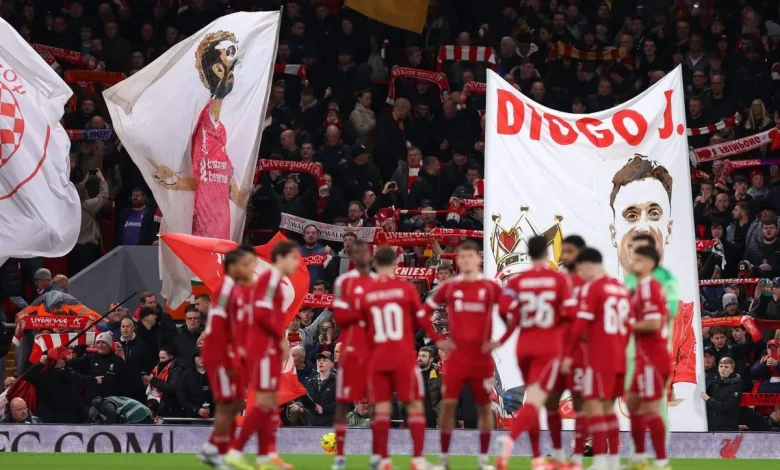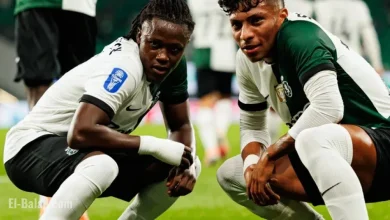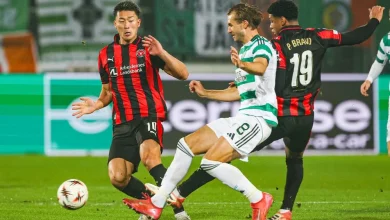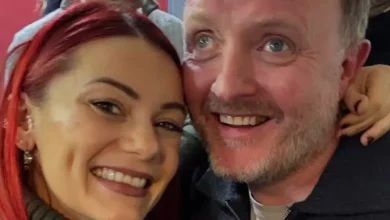Should we be talking more about Diogo Jota?

In the 20th minute of every Liverpool match this season, the same thing happens.
Regardless of the team’s fortunes on the pitch, the club’s supporters honour the late Diogo Jota — whose No 20 Liverpool shirt is now retired — with their beloved, ‘Oh, his name is Diogo’ song.
It feels like an unofficial act of remembrance for the player who died with his brother, Andre Silva, in a car crash in northern Spain 130 days ago. It is still sung at high volume, but where once it was belted out in celebration, now it comes suffused with sadness. Commentators will remind viewers of what it means, then move on, while those fans return to getting behind the team on the pitch — one that has often been struggling this season.
Liverpool won the first seven competitive matches of their 2025-26 campaign but have now lost seven of the next 10.
It is an unusually poor performance for the previous season’s title winners, particularly a club that then parted with a record outlay on transfers over the summer. Yet no defending champions in Premier League history have had to confront the death of an active senior player, one who had been in their squad for five years and helped deliver their most recent trophy success on a glorious spring day just over six months ago.
If there is a hierarchy of suffering, then it is Jota’s family who must be considered first, and perhaps they take solace from hearing his song being sung. Yet for the players and staff at Liverpool, it may be different.
It would be understandable if each time they heard the song, especially at Anfield, it made some check what they were doing. It would also be understandable if each time they have needed a goal in a game, minds darted to the occasions Jota rescued them. It would be understandable if these once apparently invincible title winners stared across at the space in the changing room where Jota used to get ready and felt a surge of grief, or began to wonder about how important football really is.
A fan visits Jota’s memorial mural outside Anfield (Darren Staples/AFP via Getty Images)
And it is understandable if all of this contributes in some way to where Liverpool are as a football team at the moment.
We like to think we can explain the game through tactics (“Arne Slot needs to try something else?”), selection (“Where should Florian Wirtz play?”) and data (“Look at Dominik Szoboszlai’s running stats”), but xG does not stand for Expected Grief.
The conversation is a really awkward one, which helps explain why so few have been willing to have it. There is a danger that if you try to show some understanding, you only end up projecting your own impressions, particularly given few players — quite understandably — have talked about their feelings.
Cody Gakpo discussed Jota’s death at some length in an interview with a handful of media outlets, including The Athletic, but it was before the start of the season, and at that point, he was still processing what had happened. Now, in the middle of a bad run, his team-mates will be wary of offering any context around their feelings because they might sound like excuses. Virgil van Dijk and Andy Robertson, the squad’s captain and vice-captain respectively, have discussed what happened over the summer as part of routine media commitments.
And then there is the role of anyone critiquing their output. You’d have to be devoid of empathy to conclude none of this is having a significant effect, yet if you reflect the human angle, especially if you are aligned with Liverpool in any way, it sounds like you are going too easy on them.
There are plenty of observers who are keen to prove themselves, attempting to fill the gap. Wayne Rooney elicited a bristling response from Van Dijk when he claimed on his BBC podcast that Liverpool had a leadership problem, initially suggesting the Dutchman had “downed tools” since signing a new contract in April.
Virgil van Dijk was hit hard by Jota’s death (Miguel Riopa/AFP via Getty Images)
Yet Rooney’s assessment seems to neglect the impact of Jota’s death on Van Dijk, who has not only had to deal with his own sense of loss but also help put others back together.
This is not a normal situation for any captain. Thankfully, Rooney cannot draw on any personal experiences about how he transformed the mood of a traumatised dressing room. For Van Dijk, it isn’t as easy as simply hollering at anyone who isn’t doing their job.
As always, it is the manager or head coach who endures the most flak when a team are not doing well. A significant chunk of Liverpool’s vast online supporter base has been getting very upset with Slot for taking holidays during these international windows. The issue has become a talking point on fan media sites and podcasts, but less discussed is how Jota’s death affected his boss, who usually gives little away in terms of emotion.
Maybe Slot has needed those breaks to try to clear his mind? He will know that only he can really solve Liverpool’s many current problems, but the chances of achieving that recede if he can’t dedicate a bit of time to himself amid all of this.
After Hillsborough, Liverpool’s then player-manager Kenny Dalglish attended funeral after funeral of fans who had died, and did his best to support everyone else until it all caught up with him, leading ultimately to his abrupt resignation less than two years later.
Just because Slot is away and getting a bit of sun on his back, it does not mean he is having the time of his life. He had worked tirelessly over the first part of the summer before Jota’s death and was heavily involved in bringing new players to the club, limiting his own time off. The burden of leading Liverpool Football Club is enormous, as his predecessor Jurgen Klopp has mentioned frequently. And that is before you factor in the crisis management he has had to learn on the job.
There is little room for football in the conversation about Jota’s passing, and quite rightly: this is a human tragedy which has deprived a mother and father of their sons, a wife of her husband, and three small children of their dad.
Yet such a traumatic event clearly will have sporting consequences for the colleagues left behind.
Jota’s death happened just as Liverpool’s pre-season was starting. He was buried in Portugal a few days later, and the rest of the squad were invited to return to training whenever they felt ready. Within a week, they were all back, but were they genuinely ready? Only they will know the answer, but it would be no surprise if many simply did not know where else to be.
Liverpool’s squad and staff assemble for Diogo Jota’s funeral (Miguel Riopa/AFP via Getty Images)
While this obviously had an effect on Liverpool’s preparations, to the point where they did not seem ready for the season in the Community Shield on August 10, either mentally or physically, it also created unforeseen challenges for the club’s array of new signings, of whom so much was expected.
Wirtz, Jeremie Frimpong, Milos Kerkez and Giorgi Mamardashvili were all getting ready to start their first training session as Liverpool players in Kirkby when the dreadful news came from northern Spain.
Try and put yourself in their position. Your new club are the reigning Premier League champions. You bounce through the doors of the training ground. The place is meant to be buzzing, but instead, all you can sense is devastation. And even if you can relate to the anguish, is it really your place to offer comfort to these men who have only just become your team-mates? You didn’t know Jota. It may feel like you are treading on someone else’s pain.
The tragedy changes everything about your first weeks on Merseyside. There is meant to be a ripple of excitement around the first warm-up friendly, but the game against Preston North End at Deepdale feels like a wake. The mood at Anfield on the opening night of the Premier League season against Bournemouth jerks between resilience, sorrow and exhaustion.
It is a reflection of where Liverpool are at that a bereavement counsellor, originally enlisted when Jota died, is still available to every member of staff at the training ground.
Since his passing in early July, Liverpool have also lost — in the space of a month — their popular former women’s team manager Matt Beard at the age of 47 and that side’s serving kit man, Jonathan Humble, who was 44.
Former Liverpool women’s manager Matt Beard died in September (Stu Forster/Getty Images)
Moving on isn’t so simple.
Jota was a different sort of footballer, whose reach stretched across the first-team level, evidenced by the array of different people who appear in a photograph taken at Cheltenham races on one of his stag-do outings. His memory remains raw, and it doesn’t take much for thoughts to wander backwards.
In September, Liverpool played back-to-back league games at home to Everton and away against Crystal Palace, the latter being where their bad run started. Last season, Jota scored winning goals in both those fixtures, and while they stumbled past Everton this time around, Palace, a fortnight later, was a step too far.
After this international break, Liverpool have a run of five league games you would ordinarily expect them to win. Yet lurking in the distance is Wolverhampton Wanderers, where Jota used to play before his move to Anfield, on December 27.
This is a season like no other for Liverpool. And just because they cannot call upon him anymore, it doesn’t mean he is not everywhere.





